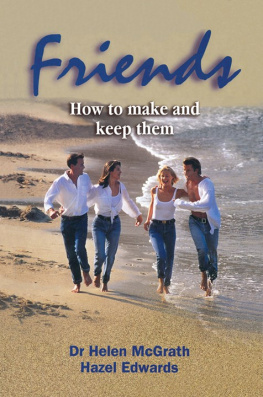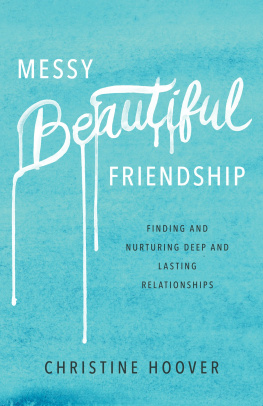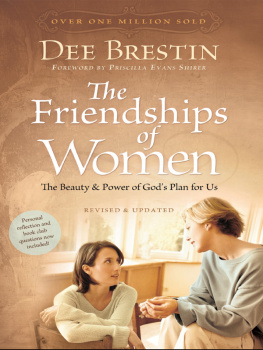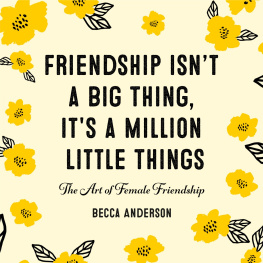
Notice
The author wishes to note that names and some personal details of the women interviewed for this book have been changed to protect their privacy. The names of her own friends and some identifying details have also been changed.
Mention of specific companies, organizations, or authorities in this book does not imply endorsement by the publisher, nor does mention of specific companies, organizations, or authorities in the book imply that they endorse the book. Internet addresses and telephone numbers given in this book were accurate at the time the book went to press.
2004 by Marla Paul
First published 2004
First published in paperback 2005
All rights reserved. No part of this publication may be reproduced or transmitted in any form or by any means, electronic or mechanical, including photocopying, recording, or any other information storage and retrieval system, without the written permission of the publisher.
Library of Congress Cataloging-in-Publication Data is on file with the publisher.
ISBN-10 1579547451 hardcover
ISBN-13 9781594861574 paperback
ISBN-10 1594861579 paperback
ISBN-13 9781623361082 ebook

To Paul and Elizabeth
Acknowledgments
I HAVE always been drawn to Native American storyteller dolls, perhaps because I am a gatherer and teller of stories. This book would not have been possible without the generosity of all the women who shared their stories with me. Many thanks to everyone who spoke to, wrote, and e-mailed me.
My husband, Paul, has been a deep well of support while I wrote this book. He read every page to offer his valuable feedback. When I was deciding whether, in fact, to write a book, my daughter, Elizabeth, inspired me by saying if I did, Id be setting a good example for her. I hope so. Shes a great example for me, too, in more ways than she knows.
My agent, Leslie Breed, has been a partner and greatly appreciated cheerleader throughout this whole process, which can be lonely at times. Thanks to Stephanie Tade at Rodale for her passion for this book. My skilled and enthusiastic editor, Jennifer Kushnier, helped hone these pages. She is a writers dream.
Judy Jordan was always willing to carve out time to share her wisdom about womens friendships and offer encouragement. Her insights have been so important over the years. Linda Hartling was tremendously helpful in locating experts and research. Judi Geake shared her experience in working with hundreds of womens groups. Harriet Mosatche generously assisted my research. Jim Coates kindly and patiently rescued me from every computer fix.
Id also like to thank Donette Jensen at the Winnetka-Northfield library for her unflagging and unfailingly cheerful efforts to help me track down obscure books and her willingness to renew them, probably more times than she should have. I appreciate the assistance of Tom Smith, who directs the General Social Survey at the University of Chicagos National Opinion Research Center.
Thanks to the past and present editors of the WomanNews section of the Chicago TribuneJean Rudolph Scott, Wendy Navratil, and Cassandra Westfor supporting my column on womens friendship. Bonnie Miller-Rubin offered sharp feedback on a tricky chapter.
I am so grateful to my close friends. My life is much richer because of all of you. My parents, Jan and Al Paul, have always been great supporters as has been my sister, Lisa Paul.
And a special thanks to Rubin Naiman, Jean-Pierre Marques, Karma Kientzler, and Mel Zuckerman.

Contents
PART ONE
The Thieves of Friendship
The Hunger for Friends

Why Everybody Feels a Pang
MAYBE there are some women who have never felt lonely for friends, but I doubt it. I believe virtually every woman has moments, or months, or years when she feels her dance card is empty, or at least not completely filled. No one is immune, not even the person who has spent her whole life in the same town and still hangs out with her old high school gang.
Losing companions may happen abruptly. Women yank up roots to relocate for a new job or to trail a spouse. The recently divorced may slip into social isolation.
But often the loss tiptoes up, the unexpected fallout of a hurried life. You race home from the office to ferry your kids to soccer practice and piano, sling dinner on their plates, and wedge in a hurried chat with your husband before you nod off in front of your favorite TV show. Who has time for friends? Theyre barely a blip on your screen, until your mother is diagnosed with Alzheimers and suddenly theres no one to call.
Or perhaps now that youve quit your job, you feel like a stranger in your own town. Youre pushing your toddler on the swings when you realize you dont know a single mother at the parkthough they all seem to know each other. You never really got to know anyone in the neighborhood because your close pals were all at work. I felt like I had two heads, lamented one of my neighbors when no one talked to her at the playground.
Sometimes you dont even realize whats missing. The only symptom of a friend shortage may be low-level doldrums, a shadowy malaise that you cant quite identify. The full measure of my own isolation smacked me in the head like a beanball when I filled out an emergency card for my daughters school after I moved to a Chicago suburb. There were spaces for three neighborhood contacts. I didnt have a single name to write in.
Unlike many of our mothers, who sank roots into neighborhoods like ancient oaksraising children, playing bridge, and drinking coffee with the same women for decadesour paths in the 21st century no longer follow neat parallel tracks. Our lives shift, veer off onto new paths, and old companions fall away. We have babies at wildly different ages or not at all. Our work lives often ricochet from a communal office to a home-based business and back again. We dip in and out of retirement.
Virtually every new life chapter has the potential to disrupt friendships: moving; leaving an office to stay home; divorce; the death of a spouse; retirement; illness. These seismic shifts can topple the walls of community.
But its not necessarily a cataclysmic event that frays connections. Life chips away at your circle. You may thrive for years in a tight group of buddies, then several take jobs out of state. Interests change. If all your friends are having babies and youre not, you may no longer have much in common with them, or feel they dont have time for you. Shy women may have always been short on companions; for them the frustration is not losing friends, but pushing past their reserve to make them.
Whatever the reason pals are scarce, the impact is the same. Its like missing an essential nutrient. Without friends, problems weigh more and pleasures yield less joy. Its a palpable void.
Nobody expects to come up empty of friends. Men, yes; friends, no. When I was young, I used to creep out of bed and spy on my mothers weekly bridge game, hoots of laughter and gossipy whispers floating up the stairs like a promise. I thought I was witnessing a glimpse of my future. Instead it was the ghost of a fleeting past.











